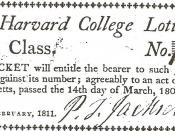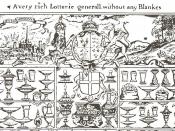The Lottery is such a complex work that even the author, Shirley Jackson couldn't explain it when questioned of its meaning. Division of Labor and Capitalism are huge themes in this story. And there is also the position that man is not yet so advanced that he still won't hesitate to perform acts of violence if it is acceptable to the general populace. There is the "monkey see monkey do" complex, which is also illustrated. And I could go on for hours about gender roles and power. However, I choose to attack the most obvious theme in The Lottery which is social conformity, because I think that it is a relevant topic, even by today's standards. In The Lottery each individual that could work (men) were suppose to do so with fervency and vigor. Working hard was expected, as was the acceptance of other social norms; to be noncompliant with these standards made one an outcast, and in this case the scapegoat.
Tessie Hutchinson, who became the sacrifice in this text, is representative of those who have broken away from tradition and been persecuted for it.
Obsession with work is apparent from the very beginning of "The Lottery." The spare moments prior to the ritual of the lottery is spent discussing things about work--tractors and planting and taxes. These are the daily issues that concern working men of the village. It is also indicated that their laughs are substituted with slight smiles; almost as if they are afraid to reveal themselves as having any fun. The boys of the village are the same. Mimicking the actions of their fathers, "their talk was still of the classroom...reprimands." They too, are tentative about play or other leisurely activity. The narrator tells us that "the feeling of liberty sat uneasily on...


